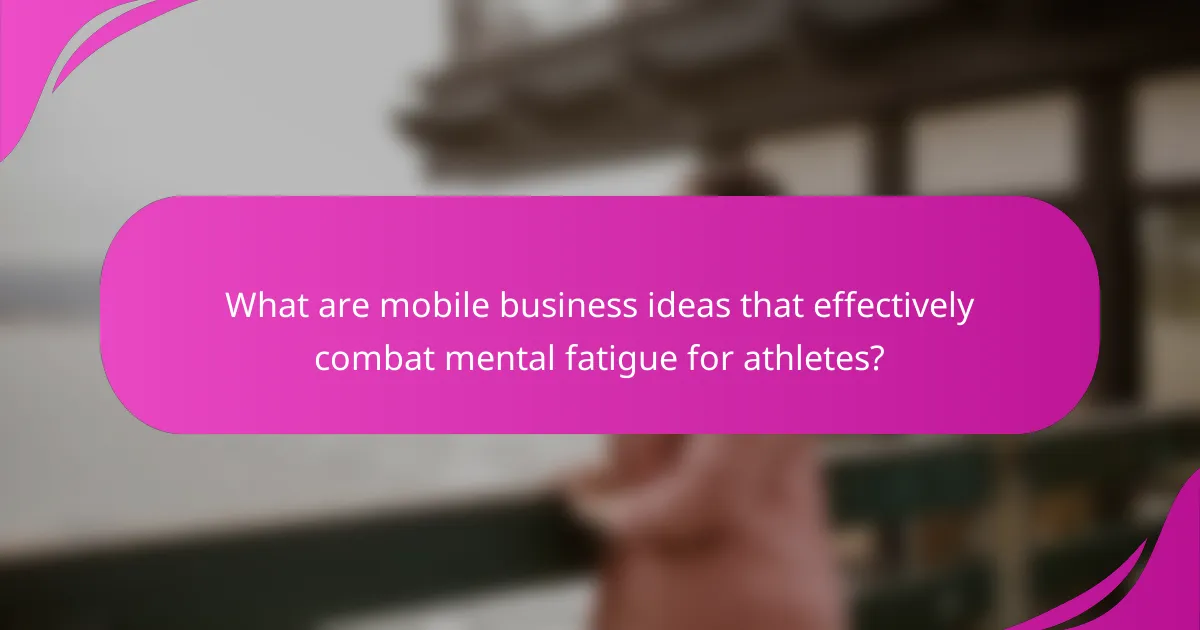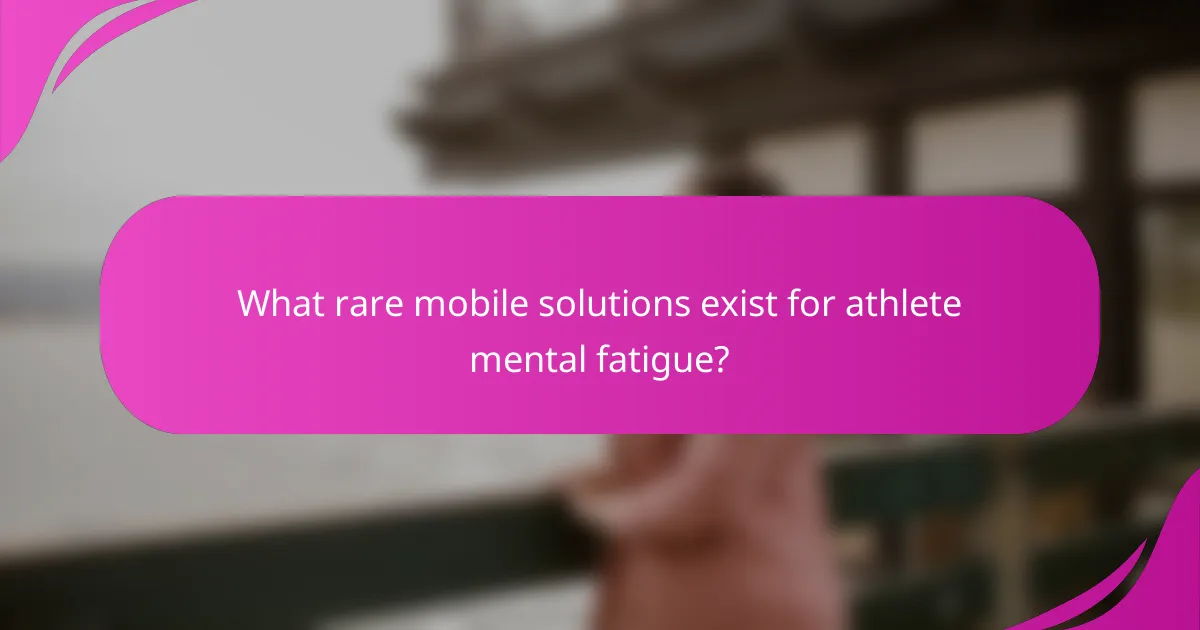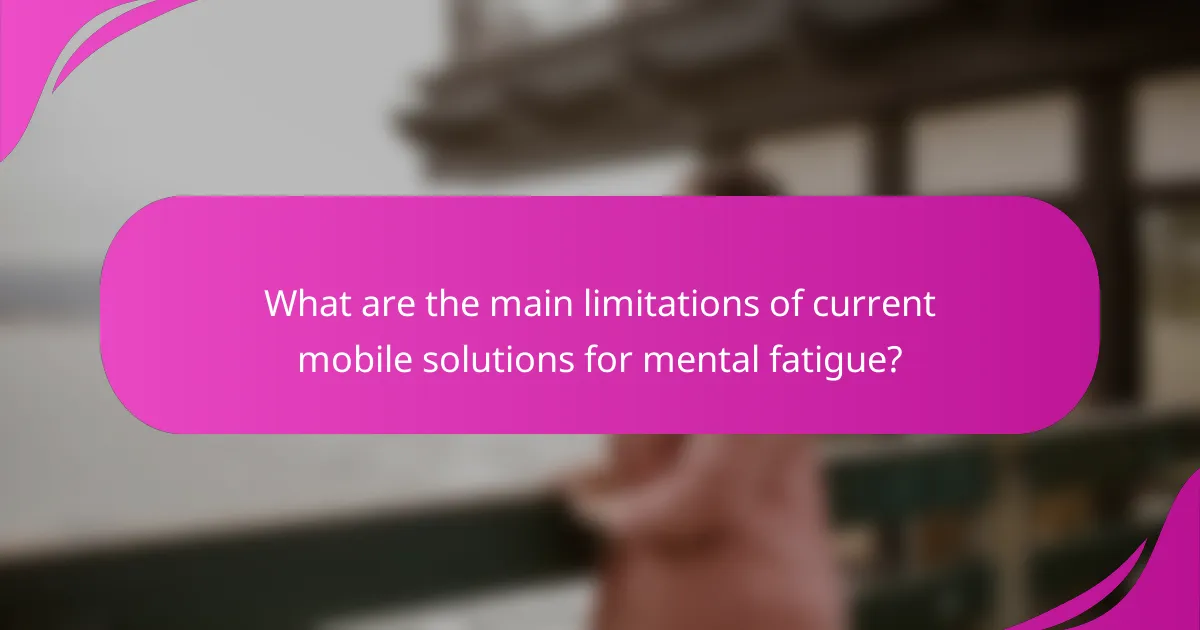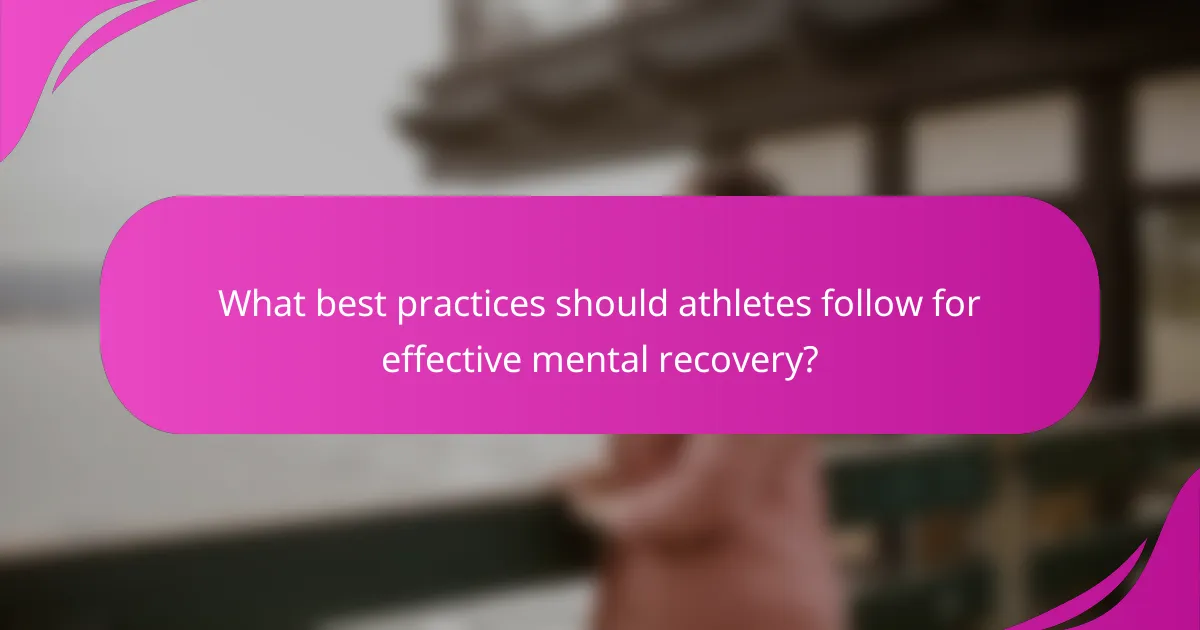Athletes often face mental fatigue, impacting their performance and recovery. Mobile business ideas such as mindfulness apps, virtual coaching platforms, and recovery tracking applications provide effective solutions. Community support networks and gamified mental training enhance resilience and engagement. Educational webinars offer valuable insights into managing mental health, optimizing recovery, and improving overall well-being.

What are mobile business ideas that effectively combat mental fatigue for athletes?
Mobile business ideas that effectively combat mental fatigue for athletes include apps focused on mindfulness, virtual coaching, and recovery tracking. These solutions enhance mental resilience and optimize recovery times.
1. Mindfulness Apps: Provide guided meditation and breathing exercises tailored for athletes to reduce stress and improve focus.
2. Virtual Coaching Platforms: Connect athletes with mental performance coaches for personalized strategies to manage fatigue.
3. Recovery Tracking Applications: Monitor sleep patterns, nutrition, and mental health metrics to identify fatigue triggers and improve recovery.
4. Community Support Networks: Create platforms for athletes to share experiences and coping strategies, fostering a sense of belonging and support.
5. Gamified Mental Training: Develop interactive games that challenge mental skills, making training engaging while building focus and resilience.
6. Educational Webinars: Offer sessions on mental health topics relevant to athletes, providing tools and knowledge to combat fatigue.
How can technology enhance mental recovery for athletes?
Technology enhances mental recovery for athletes by providing tools for mindfulness, tracking mental health, and facilitating communication with professionals. Mobile applications offer guided meditation and cognitive-behavioral techniques, promoting resilience and focus. Data analytics enables personalized recovery plans, addressing unique mental fatigue patterns. Virtual reality experiences can simulate stress management scenarios, improving coping strategies.
What role do mobile apps play in athlete mental wellness?
Mobile apps significantly enhance athlete mental wellness by providing tools for stress management and recovery. These applications offer features like guided meditation, mood tracking, and personalized mental health resources. For instance, studies show that athletes using mental wellness apps report reduced anxiety levels and improved focus. Additionally, apps can facilitate community support, allowing athletes to connect and share experiences, fostering a sense of belonging. As a result, mobile apps serve as vital resources in promoting mental resilience and overall well-being for athletes.
What features should be included in mental wellness apps?
Mental wellness apps should include features like mood tracking, guided meditation, personalized recommendations, community support, and educational resources. These elements enhance user engagement and promote mental recovery for athletes.
| Feature | Description |
|————————-|—————————————————–|
| Mood Tracking | Allows users to log their emotions and identify patterns. |
| Guided Meditation | Provides audio or video sessions for relaxation and mindfulness. |
| Personalized Recommendations | Suggests content based on user preferences and progress. |
| Community Support | Facilitates connection with others for shared experiences. |
| Educational Resources | Offers articles and videos on mental health topics. |
How can gamification improve engagement in recovery apps?
Gamification can significantly enhance engagement in recovery apps by making the process interactive and enjoyable. It leverages game-like elements, such as rewards and challenges, to motivate users. For instance, incorporating progress tracking and achievement badges encourages consistent usage. This approach can lead to improved adherence to recovery plans, ultimately fostering better mental resilience among athletes. Engaging users through gamification not only combats mental fatigue but also supports their overall recovery journey.

What unique mobile business models cater to athlete recovery?
Mobile business models that support athlete recovery focus on mental fatigue and physical wellness. Examples include mobile apps offering personalized recovery plans, virtual therapy sessions, and AI-driven mental health support. These models leverage data analysis to tailor services, enhancing recovery efficiency. Unique attributes like real-time feedback and integration with wearable tech provide athletes with immediate insights. As a result, athletes can optimize their recovery processes effectively, addressing both mental and physical health needs.
How can subscription services provide ongoing mental health support?
Subscription services can offer continuous mental health support through personalized resources and regular check-ins. These services provide access to licensed therapists, allowing athletes to manage mental fatigue effectively. Features may include guided meditations, stress management tools, and community support. By integrating mental health into their routines, athletes can enhance recovery and overall performance.
What are the benefits of virtual coaching for mental recovery?
Virtual coaching significantly enhances mental recovery for athletes by providing personalized support, flexibility, and accountability. It fosters resilience through tailored strategies, enabling athletes to manage stress effectively. Additionally, virtual coaching offers real-time feedback, which can accelerate recovery processes and improve mental well-being. This approach is particularly beneficial as it allows athletes to engage with coaches from any location, ensuring continuous support without geographical constraints.

What rare mobile solutions exist for athlete mental fatigue?
Mobile solutions for athlete mental fatigue include unique applications that leverage biofeedback, virtual reality, and personalized mental health coaching. These tools provide real-time data on emotional states and stress levels, helping athletes manage fatigue more effectively. For instance, biofeedback apps monitor physiological responses, enabling athletes to recognize and address mental fatigue. Virtual reality platforms offer immersive environments for relaxation and mindfulness, promoting recovery. Additionally, personalized mental health coaching apps provide tailored strategies and support, enhancing resilience and mental well-being. These rare solutions combine technology and psychology, offering innovative approaches to athlete recovery.
How can AI-driven analytics personalize recovery strategies?
AI-driven analytics can tailor recovery strategies by analyzing individual athlete data. This personalization enhances recovery by considering unique attributes such as injury history, training load, and sleep patterns. By leveraging these insights, mobile business ideas can provide targeted interventions, optimizing recovery times and improving overall performance. For example, athletes may receive customized nutrition plans or specific recovery exercises based on their unique recovery needs.
What innovative partnerships can enhance mobile recovery offerings?
Innovative partnerships can significantly enhance mobile recovery offerings for athletes by integrating technology and wellness services. Collaborations with fitness app developers can provide personalized recovery plans. Partnering with nutrition brands can offer tailored meal plans that complement recovery routines. Engaging mental health professionals can add psychological support features, enhancing overall athlete well-being. Collaborations with wearable tech companies can track recovery metrics, providing real-time feedback and adjustments. These partnerships create a comprehensive mobile recovery ecosystem, addressing multiple aspects of athlete recovery.

What are the main limitations of current mobile solutions for mental fatigue?
Current mobile solutions for mental fatigue often lack personalization, real-time feedback, and comprehensive data integration. These limitations hinder their effectiveness in addressing individual athlete needs. Many apps provide generic advice rather than tailored strategies, reducing user engagement and recovery outcomes. Additionally, insufficient integration with wearable technology limits the ability to monitor mental fatigue accurately.
What common mistakes do athletes make when using recovery apps?
Athletes commonly make mistakes with recovery apps by neglecting personalized settings, failing to track progress, over-relying on technology, and ignoring holistic recovery practices. These errors can undermine the benefits of recovery tools. Personalization is crucial; using generic settings may not address specific recovery needs. Tracking progress is essential for understanding effectiveness; without it, athletes may not adjust their approach. Over-reliance on apps can lead to neglecting physical cues and mental wellness. Lastly, integrating holistic practices, like nutrition and mental health, is vital for comprehensive recovery.
How can athletes optimise their use of mobile recovery tools?
Athletes can optimize mobile recovery tools by selecting those that enhance sleep quality and reduce muscle soreness. Prioritize tools with proven benefits, such as sleep tracking apps and muscle stimulation devices, to improve recovery efficiency. Regular usage of these tools can lead to significant performance gains.

What best practices should athletes follow for effective mental recovery?
Athletes should adopt practices like mindfulness, proper nutrition, and sleep optimization to enhance mental recovery. Mindfulness techniques, such as meditation, can reduce stress and improve focus. Balanced nutrition supports cognitive function, while quality sleep is crucial for overall recovery. Integrating mobile apps that promote these practices can further assist athletes in managing mental fatigue effectively.
How can athletes integrate mobile solutions into their daily routines?
Athletes can integrate mobile solutions into their daily routines by utilizing apps that focus on mental fatigue management and recovery. These solutions provide personalized training plans, mindfulness exercises, and recovery tracking, enhancing overall performance.
Mobile applications can offer features like guided meditation and sleep tracking, which are unique attributes that support mental well-being. Additionally, athletes can engage with virtual coaching and community support through these platforms, creating a rare blend of motivation and accountability.
Regular use of these mobile tools can lead to improved focus and reduced stress, directly impacting training outcomes. As a result, athletes can achieve better recovery and maintain peak performance levels.
What expert insights can improve recovery app effectiveness?
Incorporating expert insights can significantly enhance recovery app effectiveness. Focus on personalized feedback, integrating data analytics to tailor recovery plans. Leverage gamification to boost user engagement and motivation. Ensure seamless user experience through intuitive design and easy navigation. Regularly update content based on the latest sports science research to maintain relevance and efficacy.